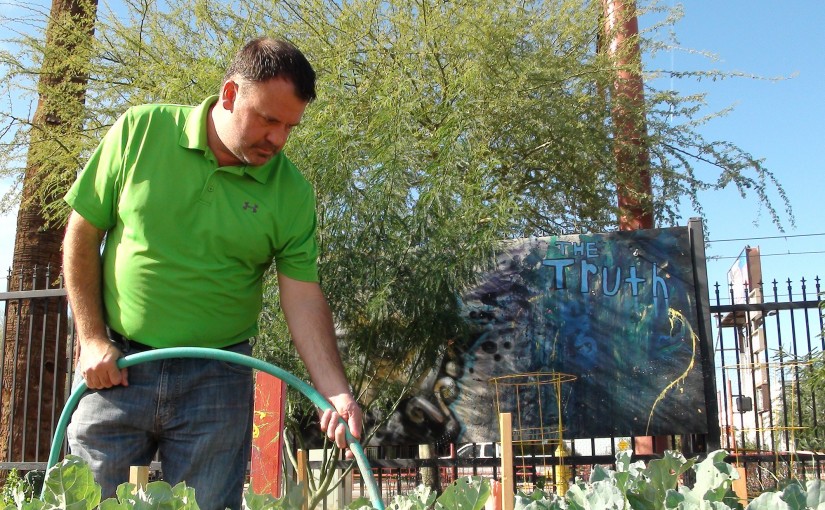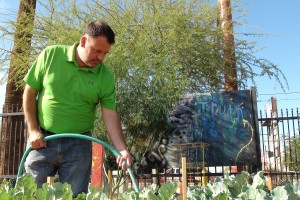Community-building another benefit as community gardens grow

Cronkite News
PHOENIX – Sean Collins doesn’t mind returning from his lunch break with mud on his shoes.
“It’s a peaceful time,” he said. “It gives me a chance to come unwind, focus, come back to center. It’s healthy. It’s nourishing.”
Collins, who works in sales and business development for a seafood wholesaler, visits his community garden plot in central Phoenix a few days each week during the cooler months to check up on everything and water his vegetables. He says that the community garden provides him the opportunity to meet and interact with an eclectic group of people.
“It’s really the unexpected benefit of this,” he said. “We’re all in the urban center, where we’re all kind of isolated and individualized. We’re all coming here to reconnect. We’re really building a hodge-podge community that’s really a quilt work.”
In addition to getting people outdoors and helping them eat better, community gardens proliferating around the country are giving people an opportunity to connect, according to Bobby L. Wilson, president of the American Community Gardening Association.
“I tell everybody, community gardens is not just growing food, it’s also growing better and healthier communities,” he said.
Wilson, who works with gardeners in Atlanta and around the U.S., said communities that work together in gardens can also work together to solve other problems.
“It brings together a lot of like-minded people, who tend to want to share ideas and communicate together,” he said.
Collins has one of 35 individual plots at the PHX Renews project, located on vacant land owned by a real estate investment company near Steele Indian School Park in central Phoenix. The project is run by the nonprofit organization Keep Phoenix Beautiful.
On a recent Saturday, his interactions with fellow gardeners included soliciting tips on keeping bugs off lettuce leaves and thwarting gophers.
“This is just this urban laboratory,” Collins said. “Different ideas, different people – we don’t know where it’s gonna go, but it’s positive.”
In addition to the private plots, the 15-acre site has space set aside for the International Rescue Committee and for the University of Arizona’s Cooperative Extension to each have gardens.
“I didn’t come here for community, but I’m finding community here,” Collins said. “It’s very stimulating, the random conversations I’ll have with people.”
Ilene Ringler lives across the street from the PHX Renews site and has a garden a few plots down from Collins’. In addition to space to plant sugar snap peas and strawberries, she said the garden has provided her with professional contacts.
“It’s a very committed, hardy group of people,” she said. “It’s a really nice way to build community. Everybody as they walk by looks over and sometimes they call in and say, ‘Oh, wow, what’s that?’ So it’s a nice way to take this corner and make it something different and something better.”
David Anaya, who manages the PHX Renews garden, said the people who garden in the individual plots have been good ambassadors for the project. He said the project’s second phase, which will add between 60 and 80 plots when it opens later this month, already has a waiting list.
“The community sort of developed itself,” he said.
David Crummey and Ryan Winkler, who began a community garden late last year in downtown Mesa, said that the programming they’ve established has created an opportunity for people to interact. Crummey said they’ve organized community events that have attracted over 100 people with live music and art.
“We’re seeing a lot of the face-to-face community action going on, which was one of our main focuses of the garden,” Crummey said.
Winkler said people rent plots at the Mesa Urban Garden for a place to grow vegetables, but also to get involved with the community events such as movie nights in the garden.
“We’ve had a lot of different events there that people have come for and enjoyed, so they’re always wanting to get an invite,” he said.















